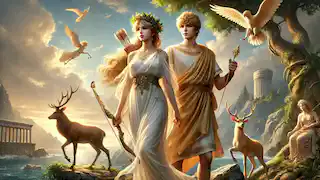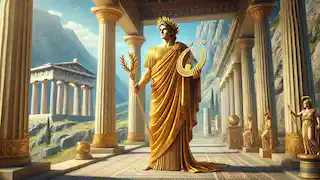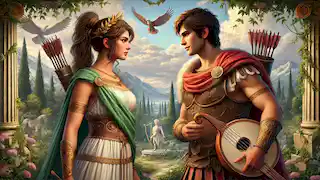The Tale of Artemis and Apollo
Reading Time: 8 min

About Story: The Tale of Artemis and Apollo is a Myth from greece set in the Ancient. This Descriptive tale explores themes of Nature and is suitable for All Ages. It offers Cultural insights. The legendary tale of twin gods, born from divinity and destined to rule light and shadow.
The tale of Artemis and Apollo begins on the sacred island of Delos, an island hidden away by the gods themselves, where myths and legends flourish under the bright Aegean sun. This story is not only about two powerful deities but about siblings who stood as opposites yet complemented each other in their divine duties. Born of Zeus, the mighty ruler of Olympus, and Leto, a goddess of gentleness and hidden strength, the twins Artemis and Apollo were destined for greatness even before their first breaths. In a time when the world was still new and the Olympian gods were consolidating their rule, Leto, daughter of the Titans Coeus and Phoebe, wandered the earth searching for a safe place to give birth. Hera, wife of Zeus, was relentless in her jealousy and forbade any land under the sun to offer sanctuary to Leto. It was then that Poseidon, god of the sea, took pity on her and revealed Delos—a tiny, drifting island shielded from Hera's wrath. Leto found refuge there, and under the shimmering starlit sky, she labored for nine days and nights. Finally, with the island of Delos anchored by Poseidon's trident, Artemis was born, arriving gracefully and peacefully. As soon as she emerged, Artemis aided her mother, helping her bring forth her brother, Apollo. This birth marked the beginning of a divine legacy. From their earliest days, Artemis and Apollo were imbued with divine attributes and unique responsibilities. Artemis grew to love the wild forests, dedicating herself to nature and animals. She became the goddess of the hunt, protector of maidens, and guardian of the wilderness. As a symbol of purity and independence, Artemis cherished her freedom above all else, often wandering the woods with her loyal band of nymphs and hunting animals as her sacred companions. Apollo, on the other hand, found his place beneath the brilliant light of the sun. Known as the god of music, healing, prophecy, and later, the sun itself, Apollo embraced his role with an artistic spirit. His golden lyre, a gift from Hermes, was his constant companion, filling the air with melodies that could soothe even the angriest gods. Apollo was also known as a skilled archer, his golden arrows precise and unerring. Together, Artemis and Apollo were two sides of a coin, symbolizing the duality of nature: light and dark, order and wilderness. As Apollo grew, so did his desire to establish his own place of worship. He journeyed across Greece, searching for a location where he could share his prophetic powers with humanity. Eventually, he arrived at Delphi, a place steeped in mystery and ancient power. Here, he encountered the monstrous serpent Python, a creature Hera had sent to hunt down Leto even before his birth. Fueled by righteous fury and armed with his divine arrows, Apollo slew Python, claiming Delphi as his sanctuary and establishing the Oracle, a conduit through which mortals could hear the divine will. The Oracle of Delphi became renowned across Greece, with people traveling from afar to receive Apollo's guidance. Delphi became a sanctuary where kings, warriors, and commoners alike sought answers to their deepest questions. Apollo, in his wisdom and fairness, granted advice that often led to great victories or hard-learned lessons, solidifying his role as a god of prophecy and wisdom. While Apollo grew in wisdom and influence, Artemis remained devoted to her life in the forests and mountains. She was a fiercely independent goddess who chose a life of chastity, making a sacred vow to remain untouched by any man. Zeus granted her request for eternal purity and gave her permission to lead a band of young maidens who shared her ideals. Together, they roamed the woods, finding solace in nature and strength in each other's companionship. Artemis’ power and grace earned her a reputation as a protector of women and children. She had a soft spot for mortals who shared her love for nature, but her wrath was swift and merciless toward those who threatened her or her sacred lands. Tales of hunters who failed to show respect to her domain often ended in tragedy, a testament to her fierce sense of justice. Despite their divinity, both Artemis and Apollo encountered mortals who captured their interest. Apollo fell deeply in love with Daphne, a nymph who, like his sister, valued her independence and wished to remain untouched. But Apollo’s love for her grew stronger, and in his pursuit, he accidentally invoked her terror. To save herself, Daphne pleaded with her father, a river god, who transformed her into a laurel tree just as Apollo was about to reach her. Heartbroken, Apollo swore to honor her forever, claiming the laurel as his sacred symbol. Similarly, Artemis had her own encounters with mortals, though she was more reserved. She met Orion, a hunter whose skill rivaled her own, and they developed a deep bond. Some myths say they were close friends, others hint at a blossoming love. But their story ended in sorrow, either through a tragic misunderstanding involving Apollo or by Artemis’s hand in a moment of anger, depending on the version told. The heavens themselves bear witness to Orion’s tale, with his constellation shining brightly. The twin gods often found themselves in sibling rivalries, challenging each other’s abilities and differing philosophies. One such contest was initiated by Niobe, a mortal queen who boasted of her fourteen children, claiming she was superior to Leto, who had only two. Enraged by this slight, Apollo and Artemis took swift retribution, striking down Niobe’s children with divine precision. This act solidified their status as gods who would not tolerate insolence, even from mortals. The twins also found themselves at odds with the other gods on several occasions. Apollo, known for his hot temper, once fought with Zeus himself, while Artemis, fiercely loyal to her ideals, clashed with Hera and Aphrodite. Yet, they remained deeply devoted to each other, each willing to defend the other when their honor or safety was threatened. As they matured into their roles, Apollo and Artemis assumed dominion over the sun and moon, respectively. Apollo's chariot of the sun marked the passage of each day, while Artemis’s silvery moonlight guided the night. Together, they maintained a cosmic balance, a symbol of harmony and unity in the universe. The people of Greece saw their relationship as emblematic of the balance between life and death, light and shadow. Apollo’s golden chariot would rise each morning, casting light across the land, inspiring poets, warriors, and lovers alike. When night fell, Artemis’s silver bow glistened in the darkness, protecting those who traveled under her watchful gaze. Their powers were formidable alone but even greater together, each understanding that their domains relied on each other for the world's balance. The legacy of Artemis and Apollo continued to inspire mortals long after the tales of their deeds faded from everyday memory. Temples to Artemis were erected in wild, secluded places, while Apollo’s shrines stood in cities and hills alike, both testaments to their enduring influence. Through their myth, they taught mortals about respect for nature, the pursuit of wisdom, and the consequences of hubris. In time, the gods of Greece fell out of favor, yet the symbols of Artemis and Apollo live on. They remind humanity of the cycles of life and the values of independence, bravery, and wisdom. Their myths are etched into the stones of Delphi and the forests of Arcadia, awaiting anyone willing to listen to the whispers of the past. Every night, as the stars appear one by one, they tell a silent tale of Artemis and Apollo. Each constellation is a part of the divine memory, a tribute to the eternal twins whose spirits linger in the heavens. Artemis roams the night sky with her hunting dogs and faithful maidens, her arrows piercing the silence. Apollo’s lyre can be heard as a faint melody, carried by the wind, reminding the world of his wisdom and guidance. And so, the tale of Artemis and Apollo lives on, not only in the hearts of those who believe but in the very fabric of nature and the cosmos. Their story is as eternal as the sun and the moon, bound to rise and set together, siblings forever in the divine dance of light and shadow.The Birth on Delos
The Early Years of Artemis and Apollo

Apollo's Quest for the Oracle
Artemis and Her Vows

The Mortal Lovers
Rivalries and Feuds

The Balance of Day and Night
Eternal Legends
Epilogue: The Stars as Eternal Witnesses


















